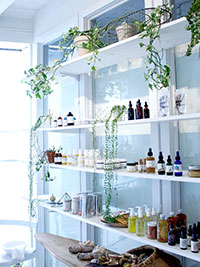
The increasing popularity of so-called “clean beauty” products, such as those sold by Noel Herbals in Somerville, indicates a rising trend among health conscious consumers. — Photo by Lillian Cohen
By Lillian Cohen
We are constantly concerned with how we look and what we put in our bodies. But what about what goes on our bodies?
The “clean beauty” market has swept through the cosmetic industry, fueled by growing concern over product ingredients and their impact on the environment. Founded on natural safe ingredients and an eco-friendly mindset, the clean beauty industry is largely made up of small businesses. And yet, the clean beauty market is currently worth $5 billion and expected to double in the next seven years, according to Brandessence Market Research, with many larger beauty companies such as Yes To and Neutrogena framing their own products toward similar values in an effort to recapture the market.
Clean beauty brands like Follian have launched national success from their Boston roots. In a city of innovation in tech and medicine, beauty and skincare establishments have entered the mix, with several studios and brands carving out a space in the area. Founded by estheticians, dermatologists, and herbalists, the local clean beauty market has not only helped support the small business community but increased attention to this national trend.
“Being here in the city, I feel we have a little bit of a disconnect with nature,” says Shannon Curtis, owner of Noel Herbals in Somerville. “The products are meant to guide you back and feel that connection again with the Earth.”
Curtis started her holistic skin practice four years ago after her mother found a space for rent in the newspaper. An esthetician for 15 years and an herbalist for five, she sees about a dozen clients a week.
“I look at it as more of the health of the skin. How does the health of the skin look and how can I help to encourage a happy balanced state for [clients] without harsh modalities?’” she explains. “Going deeper and trying to understand why something is happening is much more worthwhile than just going to a Sephora.”
One of the biggest critiques of the clean beauty industry is that there are no set standards for its label. Many mainstream companies have been accused of “greenwashing” by adding green buzzwords to their products. And yet, this concern speaks more to the general lack of national oversight on cosmetics than anything, no major regulation update happening since 1938. With the increased awareness of harmful chemicals, consumers are turning to clean beauty because though ingredients can vary between brands, they’re more likely to practice ingredient transparency.
That’s why Curtis encourages all of her clients to do their homework about their products—and not only in a chemical sense.
“Sourcing is so important. Understanding where your product is from, who’s making it, where it’s made, what the packaging is like, what are the ingredients you’re using on your skin, how are those sourced. You really just have to be mindful, and I think people are,” she says. Her own Golden Love Face Oil is a plant infusion with jojoba oil, chamomile, calendula flower, marshmallow, helichrysum, and cacay nut oil, nourishing the skin by mimicking its natural sebum.
Many of her vendors even grow their ingredients from seed to bottle, “so it’s slow beauty,” Curtis says. By paying more attention to the environment through the products themselves, brands also have to grapple with sustainability.
“Sustainability deals with the whole life cycle of a product and its impact on human beings,” says Dr. Denise Kleinrichet, associate dean at the Lam Family School of Business at San Francisco State University. “It’s one thing to say ‘Okay, ethical business,’ but there are flavors to that, and sustainability is one of those.”
She argues that sustainability is not just a smart marketing point for companies to get in on because of mainstream growing concern over the environment. It’s good for business because the economy itself is dependent on the longevity of resources.
“We want to preserve our environment because that’s what keeps us growing as a population and it’s unethical not to protect because that means we’re diminishing our own value as human beings,” says Kleinrichet.
It’s similar to how the organics industry has thrived over the last two decades, since the discovery of harmful pesticides, she points out. Today, they’re carried in nearly every supermarket across the country. And even folks who don’t buy organic still wash their vegetables before eating. There’s still that consciousness. A similar thread can be carried to clean beauty.
“It’s so easy to just go out and buy a product and not think about any of that because you kind of just want a quick fix or want results,” says Curtis. One should instead be more patient and more mindful. “To me, that’s clean beauty.”
Previously part of the medical aesthetics world, Meredith Gizmunt found her way into clean beauty through her own health journey. Owner of Meredith Lane Aesthetics on Newbury Street, which just opened in June, Gizmunt has been a practicing aesthetician for the last 16 years.
“If taking the leap to start a business wasn’t scary enough, I think the fact that I was mid-pandemic lockdown and it still made me excited, solidified that I was making the right choice.”
Her studio specializes in personalized facials, seeing about 30 clients a week. All products contain no fragrances or parabens, only a high concentration of natural ingredients. But the secret sauce comes from the facial treatments themselves, Gizmunt specializing in dermaplaning and microneedling.
“It’s like a speakeasy for good clean skincare,” she says. “Nothing makes me feel better than someone walking out with glowing gorgeous skin.”
Education is so important to Gizmunt, who left traditional medicine for clean beauty after being mentored by a functional dietician, studying a holistic approach to skincare and overall health. In a similar way to her clients, it changed everything.
“It’s just a really exciting time to be in skincare,” says Gizmunt. “The fact that consumers are so knowledgeable that they’re taking ownership in what goes into their body and onto their body, in all these ways, is really inspiring. It’s exciting.”















Reader Comments